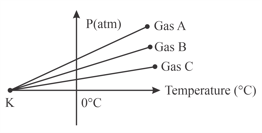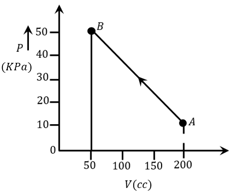JEE Main - 2 September 2020 Shift 2
Embibe Experts Physics Solutions for Exercise - JEE Main - 2 September 2020 Shift 2
Simple step-by-step solutions to JEE Main - 2 September 2020 Shift 2 questions of Thermodynamics from EMBIBE CHAPTER WISE PREVIOUS YEAR PAPERS FOR PHYSICS. Also get 3D topic explainers, cheat sheets, and unlimited doubts solving on EMBIBE.
Questions from JEE Main - 2 September 2020 Shift 2 with Hints & Solutions
Given below are two statements. One is labelled as Assertion A and the other is labelled as Reason R.
Assertion A : If and represent the heat supplied to the system and the work done on the system respectively. Then according to the first law of thermodynamics .
Reason R : First law of thermodynamics is based on law of conservation of energy.
In the light of the above statements, choose the correct answer from the option given below :
Heat is given to an ideal gas in an isothermal process.
A. Internal energy of the gas will decrease.
B. Internal energy of the gas will increase.
C. Internal energy of the gas will not change.
D. The gas will do positive work.
E. The gas will do negative work.
Choose the correct answer from the options given below :
The pressure of a gas changes linearly with volume from to as shown in figure. If no heat is supplied to or extracted from the gas then change in the internal energy of the gas will be
Heat energy of is given to a diatomic gas allowing the gas to expand at constant pressure. Each gas molecule rotates around an internal axis but do not oscillate. The increase in the internal energy of the gas will be:
A hypothetical gas expands adiabatically such that its volume changes from litres to litres. If the ratio of final pressure of the gas to initial pressure of the gas is . Then the ratio of will be.
For three low density gases pressure versus temperature graphs are plotted while keeping them at constant volume, as shown in the figure

The temperature corresponding to the point is:
The correct relation between and temperature is :
A sample of gas at temperature is adiabatically expanded to double its volume. The work done by the gas in the process is given, (given ) :

